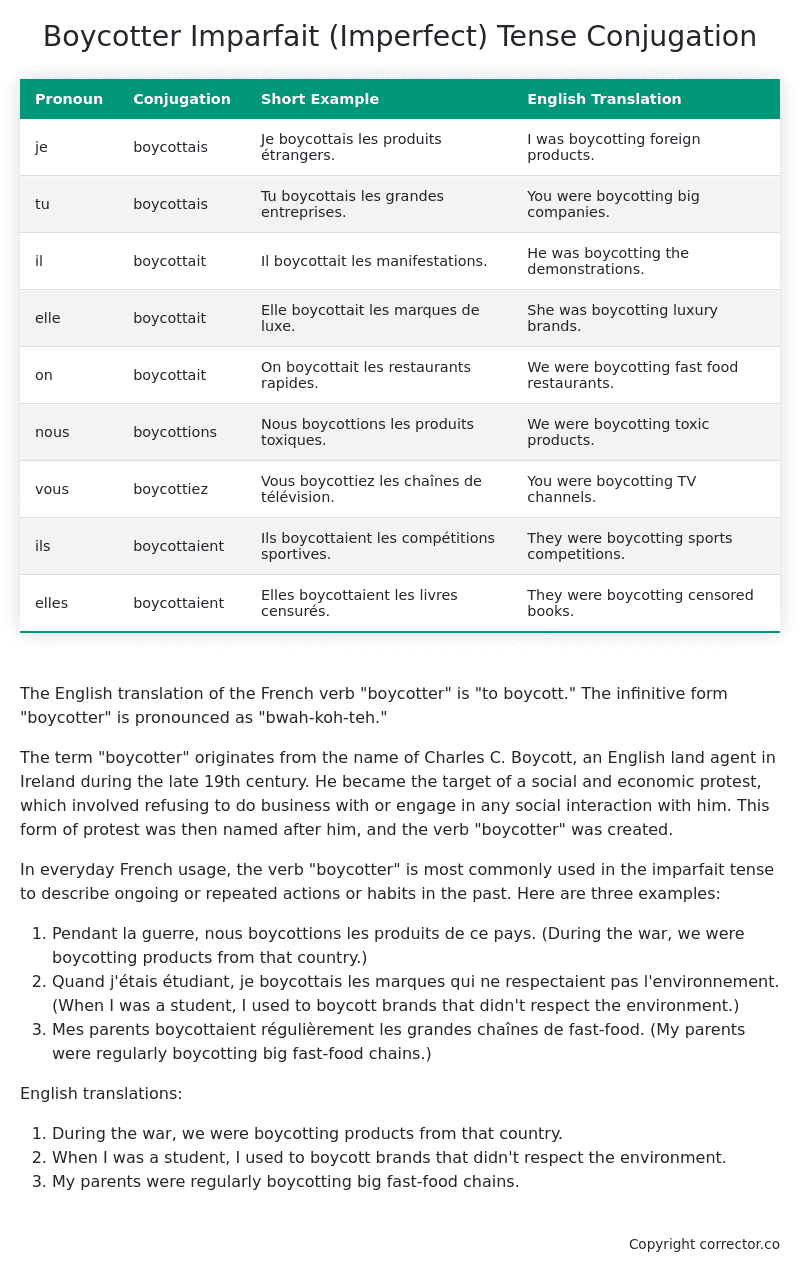Imparfait (Imperfect) Tense Conjugation of the French Verb boycotter
Introduction to the verb boycotter
The English translation of the French verb “boycotter” is “to boycott.” The infinitive form “boycotter” is pronounced as “bwah-koh-teh.”
The term “boycotter” originates from the name of Charles C. Boycott, an English land agent in Ireland during the late 19th century. He became the target of a social and economic protest, which involved refusing to do business with or engage in any social interaction with him. This form of protest was then named after him, and the verb “boycotter” was created.
In everyday French usage, the verb “boycotter” is most commonly used in the imparfait tense to describe ongoing or repeated actions or habits in the past. Here are three examples:
- Pendant la guerre, nous boycottions les produits de ce pays. (During the war, we were boycotting products from that country.)
- Quand j’étais étudiant, je boycottais les marques qui ne respectaient pas l’environnement. (When I was a student, I used to boycott brands that didn’t respect the environment.)
- Mes parents boycottaient régulièrement les grandes chaînes de fast-food. (My parents were regularly boycotting big fast-food chains.)
English translations:
- During the war, we were boycotting products from that country.
- When I was a student, I used to boycott brands that didn’t respect the environment.
- My parents were regularly boycotting big fast-food chains.
Table of the Imparfait (Imperfect) Tense Conjugation of boycotter
| Pronoun | Conjugation | Short Example | English Translation |
|---|---|---|---|
| je | boycottais | Je boycottais les produits étrangers. | I was boycotting foreign products. |
| tu | boycottais | Tu boycottais les grandes entreprises. | You were boycotting big companies. |
| il | boycottait | Il boycottait les manifestations. | He was boycotting the demonstrations. |
| elle | boycottait | Elle boycottait les marques de luxe. | She was boycotting luxury brands. |
| on | boycottait | On boycottait les restaurants rapides. | We were boycotting fast food restaurants. |
| nous | boycottions | Nous boycottions les produits toxiques. | We were boycotting toxic products. |
| vous | boycottiez | Vous boycottiez les chaînes de télévision. | You were boycotting TV channels. |
| ils | boycottaient | Ils boycottaient les compétitions sportives. | They were boycotting sports competitions. |
| elles | boycottaient | Elles boycottaient les livres censurés. | They were boycotting censored books. |
Other Conjugations for Boycotter.
Le Present (Present Tense) Conjugation of the French Verb boycotter
Imparfait (Imperfect) Tense Conjugation of the French Verb boycotter (You’re reading it right now!)
Passé Simple (Simple Past) Tense Conjugation of the French Verb boycotter
Passé Composé (Present Perfect) Tense Conjugation of the French Verb boycotter
Futur Simple (Simple Future) Tense Conjugation of the French Verb boycotter
Futur Proche (Near Future) Tense Conjugation of the French Verb boycotter
Plus-que-parfait (Pluperfect) Tense Conjugation of the French Verb boycotter
Passé Antérieur (Past Anterior) Tense Conjugation of the French Verb boycotter
Futur Antérieur (Future Anterior) Tense Conjugation of the French Verb boycotter
Subjonctif Présent (Subjunctive Present) Tense Conjugation of the French Verb boycotter
Subjonctif Passé (Subjunctive Past) Tense Conjugation of the French Verb boycotter
Subjonctif Imparfait (Subjunctive Imperfect) Tense Conjugation of the French Verb boycotter
Subjonctif Plus-que-parfait (Subjunctive Pluperfect) Tense Conjugation of the French Verb boycotter
Conditionnel Présent (Conditional Present) Tense Conjugation of the French Verb boycotter
Conditionnel Passé (Conditional Past) Tense Conjugation of the French Verb boycotter
Conditionnel Passé II (Conditional Past II) Tense Conjugation of the French Verb boycotter
L’impératif Présent (Imperative Present) Tense Conjugation of the French Verb boycotter
L’impératif Passé (Imperative Past) Tense Conjugation of the French Verb boycotter
L’infinitif Présent (Infinitive Present) Tense Conjugation of the French Verb boycotter
L’infinitif Passé (Infinitive Past) Tense Conjugation of the French Verb boycotter
Le Participe Présent (Present Participle) Tense Conjugation of the French Verb boycotter
Le Participe Passé (Past Participle) Tense Conjugation of the French Verb boycotter
Struggling with French verbs or the language in general? Why not use our free French Grammar Checker – no registration required!
Get a FREE Download Study Sheet of this Conjugation 🔥
Simply right click the image below, click “save image” and get your free reference for the boycotter imparfait tense conjugation!

Boycotter – About the French Imparfait Tense
NOTE: To take a deep dive into all the French tenses then see our article on Mastering French Tense Conjugation.
Formation of the Imparfait Tense
For regular -er verbs:
For regular -ir verbs
For regular -re verbs
Common Everyday Usage Patterns
Description of Past Habits
Background Information
Mental and Emotional States
It’s employed to express emotions, thoughts, or physical sensations in the past. For example: “J’étais content quand il est arrivé.” (I was happy when he arrived.)
Ongoing Actions
Points to Note About the Imparfait Tense
Passé Composé vs. Imparfait
Conditional
Si Clauses
Narration
I hope you enjoyed this article on the verb boycotter. Still in a learning mood? Check out another TOTALLY random French verb imparfait conjugation!


